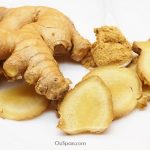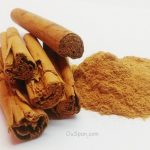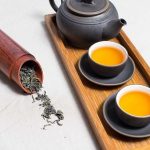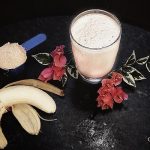
A bright yellow-orange rhizome, turmeric (Curcuma Longa) is well-known for its distinct color, flavor, and medicinal properties and sometimes called the Golden Spice or Indian Saffron. This spice has been used for many centuries in a traditional Indian Ayurvedic medicine and as a component in religious ceremonies in Southeast Asia.
The active ingredient of turmeric, curcumin has powerful medicinal properties and might be beneficial for preventing and treatment of a variety of health issues including cancer, arthritis, depression, gastrointestinal disorders, liver diseases, and much more. Read more about Impressive Turmeric Health Benefits.
Turmeric Side Effects
Turmeric is generally safe. If used correctly, the risks for turmeric side effects appear to be minimal. It was found that there were no significant toxicities of curcumin even consumed at a highly daily dose of 12 g (2).
However, in rare cases, turmeric might cause problems in some people. Here are a few things to consider.
Do not consume turmeric if you are pregnant or breast-feeding. Stop taking turmeric before scheduled surgery. Due to turmeric is a blood-thinner, it can slow blood clotting.
Do not take turmeric supplements if you have gallbladder diseases. Due to the gallbladder contracts in response of curcumin, even a small amount of it can cause a gallbladder obstruction.
Turmeric is high in oxalates and 91% of them are soluble. Soluble oxalates bind calcium forming insoluble calcium oxalates. High doses of supplemental turmeric may increase risk of hyperoxaluria (kidney and bladder stones formation) in some people (4).
Due to curcumin binds absorbable iron in the gut, high doses can cause iron deficiency anemia (12). Individuals on a low-iron diet or those who have iron deficiency anemia should look for a medical advice about turmeric extracts use. On other hand, this property might be useful to tread conditions such as hemolytic anemias and sickle cell disease.
Curcumin can block sperm motility and function (13). These findings may have application in development of a non-steroid contraceptive.
High doses of turmeric can lead to headache, dizziness, rash, bloating, diarrhea, nausea, and similar digestive issues.
Some turmeric powders may also be high in lead, a heavy toxic metal. In the past several years, 13 brands of lead-contaminated turmeric have been recalled in the United States (5). Turmeric extracts are unlikely to be contaminated with heavy metals, insect and rodent body parts (6).
Interactions with Medications
Interactions with anticougulants & antiplatelets. High amounts of curcumin havepiperine can increase risk of bruising and bleeding. If you already take blood-thinning medications such as warfarin (Coumadin), clopidogrel (Plavix), aspirin, dipyridamole (Aggrenox, Persantine), or others, you might have to avoid curcumin.
Curcumin may increase stomach acid interfering with drugs that reduce the stomach acid production: Cimetidine (Tagamet), Famotidine (Pepcid), Ranitidine (Zantac), Esomeprazole (Nexium), Omeprazole, and Lansoprazole (Prevacid) (3).
Turmeric supplements can intensify effect of drugs that lower blood sugar. Be cautious if you take diabetes medications to lower blood sugar.
Curcumin may interfere with iron supplements that treat iron deficiency anemia.
Some turmeric supplements contain a chemical ingredient piperine which helps enhance curcumin absorption. However, piperine can slow down process of decomposing some medicine in the liver that, in turn, can cause side effects from medications. Also, piperine can have a blood-thinning effect and can cause gastric irritation and bleeding (14) (15).
Talk to your healthcare provider if you are taking any medicine.
Related
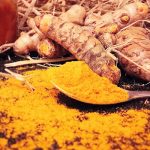 Impressive Turmeric Health Benefits
Impressive Turmeric Health Benefits
Turmeric has a number of medicinal properties which are beneficial to people trying to prevent a number of diseases...
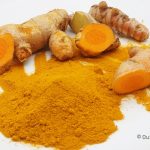 Turmeric Uses | Spice vs Supplement
Turmeric Uses | Spice vs Supplement
There is no universal recommendation for turmeric consumption. Turmeric can be used in fresh or ground form...
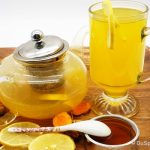 Cooking with Turmeric – Turmeric Beverages
Cooking with Turmeric – Turmeric Beverages
Fresh or ground spice can be used to make turmeric beverages including turmeric water, tea, smoothies, shakes...
 Cooking with Turmeric – Natural Food Coloring
Cooking with Turmeric – Natural Food Coloring
Turmeric can be used to dye any fabric, but here we will talk about natural food coloring that can be fun for kids and adults...
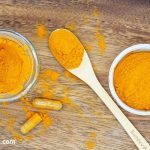 Shopping for Turmeric – Best Turmeric Supplements & Powder
Shopping for Turmeric – Best Turmeric Supplements & Powder
When you shopping for turmeric supplements, there are a few things to consider...
1. James W. Daily et al. Efficacy of Turmeric Extracts and Curcumin for Alleviating the Symptoms of Joint Arthritis: A Systematic Review and Meta-Analysis of Randomized Clinical Trials. NCBI. 2016
2. Matthew C. Fadus et al. Curcumin: An age-old anti-inflammatory and anti-neoplastic agent. NCBI. 2017.
3. Possible Interactions with: Turmeric. Penn State Hershey Medical Center.
4. Tang M. et all. Effect of cinnamon and turmeric on urinary oxalate excretion, plasma lipids, and plasma glucose in healthy subjects. NCBI. 2008.
5. Whitney Cowell et al. Ground Turmeric as a Source of Lead Exposure in the United States. 2017.
6. Turmeric Spice vs. Turmeric Supplements. ConsumerLab.com
7. Belcaro G. et al. Meriva®+Glucosamine versus Condroitin+Glucosamine in patients with knee osteoarthritis: an observational study. NCBI. 2014.
8. Panahi Y et al. Curcuminoid treatment for knee osteoarthritis: a randomized double-blind placebo-controlled trial. NCBI. 2014.
9. Nakagawa Y, Mukai S, Yamada S, et al. Short-term effects of highly-bioavailable curcumin for treating knee osteoarthritis: A randomized, double-blind, placebo-controlled prospective study. NCBI. 2014.
10. Yang YS et al. Lipid-lowering effects of curcumin in patients with metabolic syndrome: a randomized, double-blind, placebo-controlled trial. NCBI. 2014.
11. Somlak Chuengsamarn, MD et al. Curcumin Extract for Prevention of Type 2 Diabetes. NCBI. 2012.
12. Yan Jiao et al. Curcumin, a cancer chemopreventive and chemotherapeutic agent, is a biologically active iron chelator. American Society of Hematology. 2009.
13. Rajesh K. Naz. The Effect of Curcumin on Intracellular pH (pHi), Membrane Hyperpolarization and Sperm Motility. NCBI. 2014
14. Myers BM, Smith JL, Graham DY. Effect of red pepper and black pepper on the stomach. NCBI. 1987.
15. Raghavendra RH, Naidu KA. Spice active principles as the inhibitors of human platelet aggregation and thromboxane biosynthesis. NCBI. 2009
